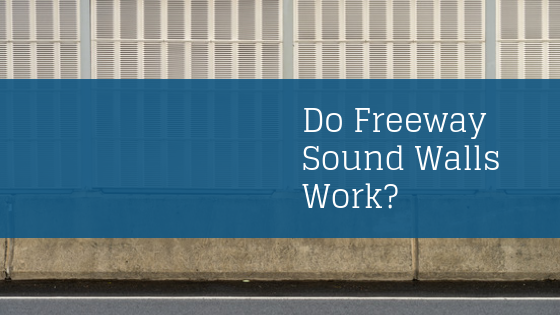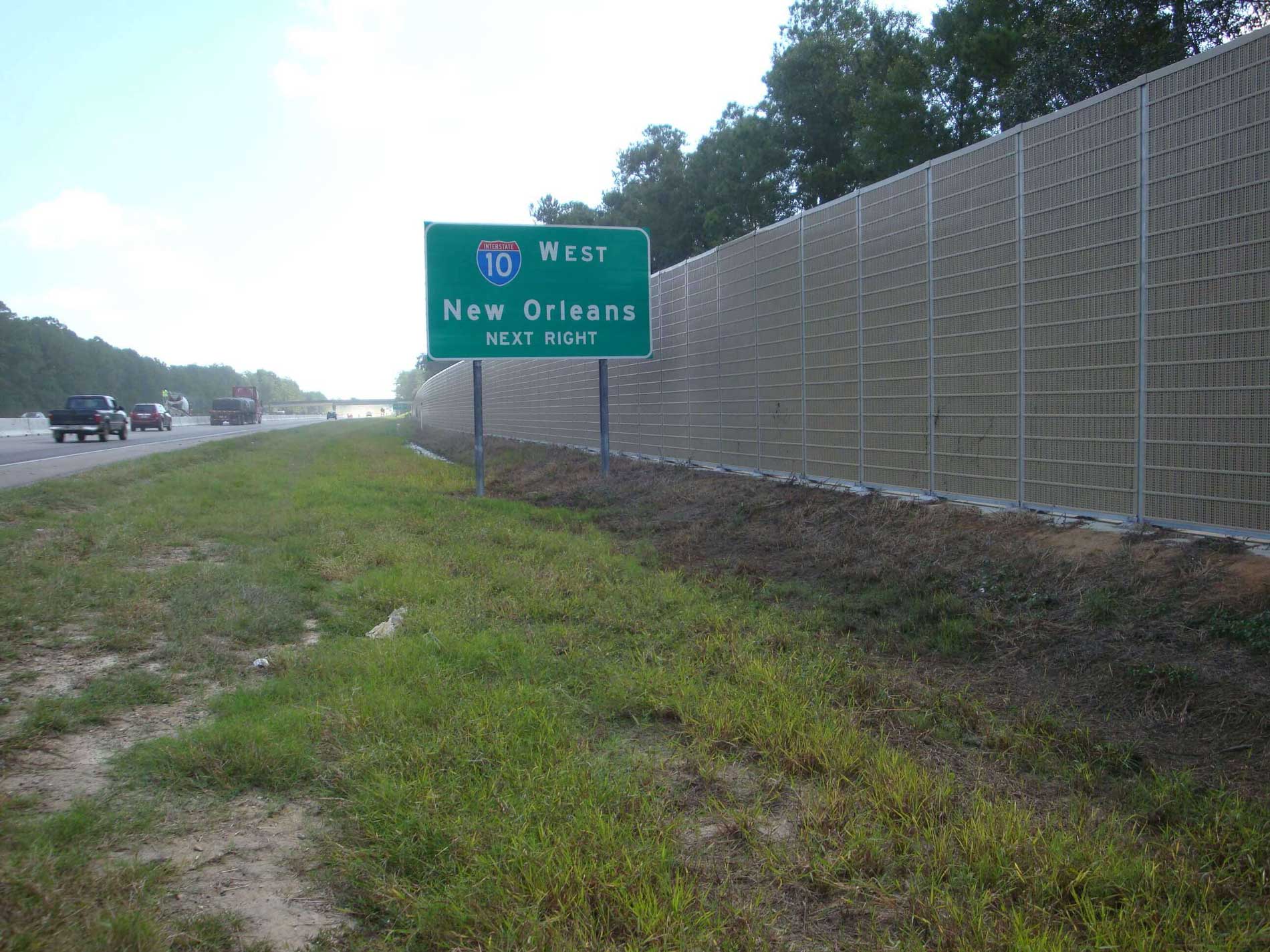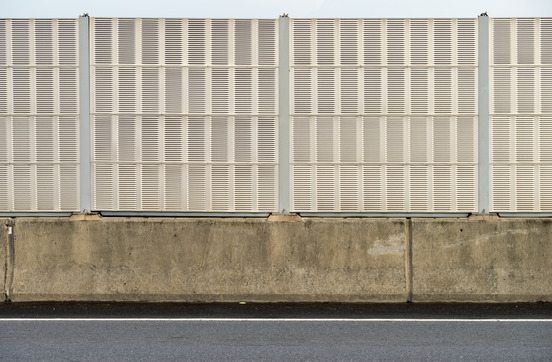We all get stuck in bumper to bumper traffic whether it is to commute to work, head out for vacation, or to go to popular events. When you are sitting in traffic, you probably think about the sights and sounds around you.

If you travel long distances or are frequently on the highway, you may also notice one or several types of noise abatement solutions in the form of large walls aligning the roadway.
Have you ever considered why there are different types of sound walls and if they even work?
How Highway Noise Barriers Work
Believe it or not, highway noise barriers and sound walls are the subject of many federal, state, and local studies and discussions.
Traditionally, these blockades use metal, brick, concrete or wood to minimize the loud noises generated by highway traffic.
These highway sound barrier walls are important to keep offensive freeway sounds from penetrating local neighborhoods and business districts. Studies show the first attempts at blocking the sound creates a couple of problems.

First, the materials used did not sufficiently lower the sound levels in the targeted areas. Highway walls that are not sufficiently tall allow the sound to go over the top of the barrier.
Second, using sound-reflective concrete walls on both sides of the highway often causes the noise to reverberate or bounce back and forth across the Interstate. The noise levels can increase or become higher in frequency when this reflection effect happens.
This is why outdoor noise control is important with residential and commercial businesses being located so close to heavy traffic areas.
Disadvantages of Concrete Highway Barriers
Newer research proves concrete sound barrier walls are some of the worst offenders for creating unwanted and unpredictable reflected noise issues.
The sound waves hit the wall and the reflective surface of the concrete causes the sound wave to go in the opposite direction.
Excessive Noise Contributes to Numerous Health Problems
- Circulatory issues like high blood pressure, heart attack, and stroke
- Nervous system problems including irritability, mood swings, depression, and anxiety
- Lack of sleep or trouble getting restful slumber
- Immune suppression, problems healing, and chronic health issues
Sound wall construction with acoustic panels help reduce high and low-frequency noise levels that contribute to these health problems. Advancements in noise testing and sound dampening materials offer a tremendous advantage for local municipalities and government entities.

Instead of attempting to block the sound or bounce it to a less populated area, noise dampening materials like mineral wool between layers of perforated fiberglass diffuse and absorb much of the unwanted sound.
Such sound-absorptive panels “kill” the noise by making the sound wave use up its energy as it passes through strategic openings in the wall.
Benefits of Highway Noise Control
- Fewer headaches and problems hearing
- Better rest
- Improvement in work production
- Better attendance because of a reduction in lack of sleep or noise related health issues
Additional Benefits To Highway Sound Barriers
Absorptive panels are pre-engineered and easily customized for each site and application. Walls designed with the best materials have protective UV coating and will not rust, rot, or deteriorate in extreme temperatures.
Since these walls use lightweight materials, they work extremely well for areas with weight restrictions.

Conversely, concrete noise barriers are dense, hard to recycle, and not mobile. Studies show a sound wall are more effective sound-reflective sound barriers.
Such innovations ensure freeway sound walls reduce sound levels and provide a cost-effective solution to highway noise pollution.
Sources:
https://www.fhwa.dot.gov/Environment/noise/noise_barriers/design_construction/design/design05.cfm
https://www.soundfighter.com/products/retrosorb/
https://undark.org/article/highway-noise-barrier-science/
I live in a neighborhood in Montgomery AL that is adjacent to I-85. The highway noise is noticeable. I have noticed this technology used in other cities throughout the country. I wish your company would talk to the city, county and state about the benefits of using this sound abatement solution on I-85 in Montgomery. I-85 originates and cuts through the heart of Montgomery. I-85 and I-65 intersect in Montgomery. The amount of highway or interstate traffic is significant.
I would like to start a petition to have a sound wall built where I live along 1-95
I noticed your message and want to know how you went about getting any information about I95 . I just moved to a location that backs up to the turnpike and the noise is worse than I thought.
Thanks for any info you can share.
Tony
We are a neighborhood in Portsmouth NH hoping to get a long needed sound barrier installed on #95 near the traffic circle. On 8/25 we are scheduled to a visit by state, federal and city officials. Your barriers sound like a good solution to a problem that has grown in need for over 30 years. Would love to have you contact either the NH DOT, or our city manager, Karen Conard. I hope your quote is acceptable to the decision makers,, sounds like the absorbsion value is the most important issue.
I am attempting to get the Florida Highway Administration to install a sound remediation system. along I-95 in Rockledge, Florida, So far they have avoided the issue. We need expert help in getting a hearing on the issue. Can you help?
Interstate 75 Omaha,NE will be resurfaced . Could use sound fighter systems on noise pollution.
Like others here, I live in a home with a ridiculous amount of highway noise. I am on State Hwy 80, just east of Somerset KY. The highway was cut into a dense hill directly in front of the house (about a half block away), about 1/4 mile from where a moderate decline begins.
I was able to block most of it with foam and acoustic panels in the walls, it’s the redneck trucks with no mufflers, the intentionally loud engine brakes, and the high revving trucks running too low of a gear climbing the other side of the highway.
From the upstairs (open) window, it averages about 45dB, with the loud engine brakes peaking between 80-90dB as they pass by 24 hours a day. It actually gets worse at night, as the traffic becomes predominantly semis.
To give you perspective, I lived right next to McChord AFB is Tacoma Wa in my 20s. F15s routinely took off a few blocks away. The traffic on this highway is *significantly* louder than fighter jets taking off, and impossible to sleep thru.
The sound test I did, showed the 80dB threshold is crossed roughly 11 times an hour between 10pm and 6AM.
State and local govt refuse to even allow a sign “requesting” ceasing engine braking at night. They say that it will endanger the state to lawsuits if a truck loses its air brakes –like anyone would care about a sign if they legitimately lost their brakes!
I’ve planted a hedge out front, but it’ll be years before it’s big enough to block anything. If something doesn’t change soon, I’m going to lose my mind. I’m thinking of building a cinder block wall outside my bedroom, but that would be very unattractive… Ugh
I am located in Michigan and our backyard (as well as several others) back up to a major expressway only YARDS away. The noise is deafening. I’ve notice plants don’t thrive and even my hair/clothes and dogs smell after being outside. Sleep deprivation from the noise pollution is also an issue.
I am asking in detail the process I need to take with our county/city to have this built? I have tried to start contacting them already and asked them the process and I get the run around.
Hi Kimberly!
Which highway and where in Michigan? I am interested in the same thing.
I live in northern California and Hwy 99 was built long after my neighborhood. It is the main artery through town and the traffic is constant. There is no downtime. I am going to start an action to get a sound barrier built. I am told there is 4 criteria needed – the neighborhood exited prior to the freeway, the decibel has to be higher than 67 dba, noise mitigation must be designed to lower by at least 5 decibels and the project must be cost effective (I am not sure of the the cost per residential unit).
Why are contract builders permitted to build homes in areas with excessive road noise and ask buyers to pay too dollar for it.
Why pay full
How do you start to petition for this type of wall when your property literally borders the highway? Where does one start?
In Ohio, there is a petition form to apply for a sound barrier wall if needed. In our state it is on the ODOT site.
We live in southern California across the frontage road from the freeway. Cal Trans has decided NOT to build a sound wall. We have an 8 foot double sided wooden fence, but would like to add baffling to the top to block out the excessive noise. Has anyone had experience with this or know of a product to recommend that will attach to the top of a wooden fence.
В интернет магазине https://mob.genmens.ru/ представлен широкий ассортимент дженериков для повышения
потенции производства Индии.Высокое качество по доступным ценам в Санкт-Петербурге и Москве
отправка в другие регионы почтой России.Действуют накопительные скидки для постоянных клентов
гарантированная анонимность заказа.
Nie zwlekaj i zagraj w najbardziej ekscytujące gry kasynowe w sieci! Świetnie napisane, bardzo dziękuję za udzielenie porad.
Ten materiał świeci jasno w morzu przeciętności, dostarczając autentycznej, istotnej wartości w każdym punkcie. Mostbet Casino Marzenia o wielkiej wygranej są bliżej niż myślisz! W świecie ekscytujących gier każdy spin to kolejna szansa. Odkryj dreszcz emocji, jakie oferuje zabawa w prawdziwym stylu. Twoja intuicja może zapewnić imponującą nagrodę. Nie czekaj – fortuna sprzyja śmiałym! To może być Twój moment na spektakularną wygraną. Przystąp do grona prawdziwych graczy już dziś!
I found this blog post really insightful! It’s fascinating to learn how highway noise barrier walls can effectively reduce noise pollution for nearby residents. It’s such an important consideration for urban planning. I wonder how different materials and designs impact their effectiveness. Thanks for sharing this information!
Great insights! I had always wondered how effective these noise barrier walls really are. It’s interesting to learn about the different factors that influence their performance. I’d love to see more examples or case studies in the future!
Aviator merges exploration with exciting rewards.
Jump into the cockpit and spin through turbulent skies for huge multipliers.
With its vintage-inspired design, the game evokes the spirit of early aviation.
https://www.linkedin.com/posts/robin-kh-150138202_aviator-game-download-activity-7295792143506321408-81HD/
Watch as the plane takes off – cash out before it vanishes to lock in your rewards.
Featuring seamless gameplay and dynamic sound effects, it’s a must-try for slot enthusiasts.
Whether you’re chasing wins, Aviator delivers non-stop action with every round.
On this site, you can discover an extensive selection internet-based casino sites.
Whether you’re looking for traditional options latest releases, there’s something for any taste.
All featured casinos checked thoroughly for trustworthiness, allowing users to gamble with confidence.
casino
Additionally, this resource provides special rewards and deals to welcome beginners as well as regulars.
Due to simple access, locating a preferred platform happens in no time, making it convenient.
Stay updated on recent updates by visiting frequently, since new casinos are added regularly.
Very informative post! I always wondered how effective these noise barriers really are. It’s surprising to learn about the different factors that can influence their efficiency. Thanks for breaking it down!
This website, you can discover a great variety of slot machines from famous studios.
Visitors can try out traditional machines as well as feature-packed games with stunning graphics and bonus rounds.
Whether you’re a beginner or an experienced player, there’s always a slot to match your mood.
casino games
Each title are instantly accessible round the clock and compatible with desktop computers and mobile devices alike.
You don’t need to install anything, so you can get started without hassle.
The interface is intuitive, making it simple to find your favorite slot.
Register now, and discover the thrill of casino games!
id=”firstHeading” class=”firstHeading mw-first-heading”>Search results
Help
English
Tools
Tools
move to sidebar hide
Actions
General
I live in Vienna, VA off I-66. The noise has gotten worse and worse as they have widened the road and haven’t done anything to inprove the noise abatement wall. We need something done.